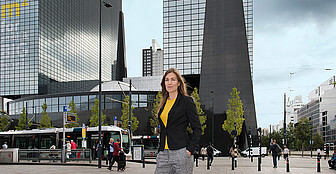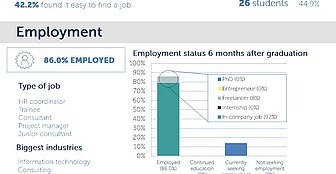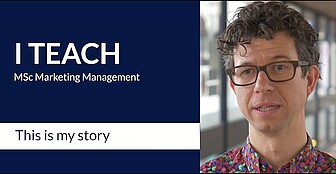
This website uses functional cookies, including analytical cookies. The obtained statistical data cannot be traced back to individual users. Additionally, you can choose to accept or refuse consent to use marketing cookies. If you decline these additional cookies or refrain from making a choice, only functional cookies will be set. See our cookie policy for more information.
Article: Thursday, 12 January 2023
If addressing important humanitarian and development problems – the ‘global grand challenges’ – is a priority for all kinds of organisations working together, why is progress so slow? It might be because there are systemic barriers preventing responses from being effective. These barriers have been identified by Dr Corinna Frey-Heger, an assistant professor in the department of Business-Society Management at Rotterdam School of Management, Erasmus University (RSM). Her research shows that without awareness of these barriers, organisations may actually intensify the problems they mean to solve. And she points out how important it is to think about managing these problems differently than you would for typical business problems.
Dr Frey-Heger and her co-researchers wanted to find out how organisations like UN agencies, NGOs and humanitarian charities could respond more efficiently to the grand challenge of global displacement.
The outcome wasn’t what they expected. “We were focusing purely on acute refugee crises because we thought this was the problem. We were wrong!” Instead, Dr Frey-Heger’s research identifies barriers that result in relief organisations moving further away from – and perhaps unwittingly intensifying – the problems that arise when they respond to refugee crises.
The researchers focused on Rwanda in 2015, shortly after thousands of refugees arrived from Burundi. Dr Corinna Frey-Heger stayed for three months to better understand how humanitarian organisations respond to acute displacement.
Displacement: The movement of persons who have been forced or obliged to flee or to leave their homes or places of habitual residence (whether within their own country or across an international border), in particular as a result of or in order to avoid the effects of armed conflict, situations of generalized violence, violations of human rights or natural or human-made disasters.

“What stood out was not the acute crisis, but the long-term nature of displacement in Rwanda. Most refugee camps there had existed for more than five years, others for more than a decade, and they found families that had been in the camps for years. New generations had been born and raised in these refugee camps,” she said.
Yet not only did these people often receive the same first aid-kits, emergency food rations, blankets and water as if they had just arrived – overwhelming and frustrating the aid workers – but also the longevity of refugee camps made it more likely that problems would arise. The longer the contained camps were in existence, the more conflicts with surrounding communities, funding shortages, and intensified violence. Interviewees told Dr Frey-Heger that organisations even had to divert funding to mitigate the results of having created a social hotspot in the camps.
It turns out that these problems originated from relief organisations’ responses that initially appeared to be sensible but would later become a hindrance.
Part of the problem, say the researchers, is that the actions causing the barriers are often so deeply engrained that organisations and professionals are often not even aware of them. Previous research has predominantly offered micro-level or psychological explanations, but Frey-Heger’s research offers an understanding of the macro-level barriers that prevent organisations from effectively tackling grand challenges.
Awareness of these barriers may be an important prerequisite for overcoming them in practice, and that might be true for organisations working on other grand challenges too.
On a societal level, our study helps to unpick the barriers that organisations face in tackling grand challenges, and what makes our study important is that we outline how organisations themselves may be implicated in forming those barriers
Dr Frey-Heger gives an example – and it’s a surprisingly fundamental one. What happened was that organisations working together needed to find some common ground and a shared underlying value to guide their joint response to displacement. In the case that she observed, the organisations agreed on ‘protection’. However, when she interviewed the organisations’ employees, they referred to “an obsession with the protection mandate” that discounted any alternative values and effectively limited the solutions available.
“On a societal level, our study helps to unpick the barriers that organisations face in tackling grand challenges, and what makes our study important is that we outline how organisations themselves may be implicated in forming those barriers,” she said.
“Keep this research in mind because it identifies the barriers engrained in the wider system – if you know what to look for. It is very difficult to detect them, and our study helps to create awareness for these barriers and their unintended consequences.”

Corinna Frey-Heger is an Assistant Professor in the Business-Society Management department. As a qualitative scholar, she draws on organization theory (institutional theory, practice theory, pragmatism) to better understand organization's responses to grand challenges and wicked problems, such as global displacement. Currently, she is particularly interested in how organizations' responses to these problems intensify the very problems they are meant to solve. She has conducted ethnographic fieldwork in refugee camps in Rwanda and Lebanon. She completed her PhD in 2018 at the University of Cambridge. Her dissertation on 'Organizing in times of global displacement and refugee crises' won the SAMS Grigor McClelland Doctoral Dissertation Award 2019.
The research No End In Sight: How regimes form barriers to addressing the wicked problem of displacement by Corinna Frey-Heger, Marian Konstantin Gatzweiler, and Bob Hinings was published in Organization Studies (STAR) in 2021, and has already earned two accolades, the Grigor McClelland award in 2019 and the EGOS Best Student Paper Award in 2018.

Wicked problems are complex and dispersed challenges that go beyond the capacity of individual organizations and require a response by multiple actors, often in the form of transnational regimes. While research on regimes has provided insights into such collective responses, less is known about how such regimes may form barriers that hinder and block appropriate responses to addressing wicked problems. Exploring the problematic role of regime-level responses is timely given that many of today’s wicked problems are far from being alleviated and in many instances appear instead to be intensifying. We draw from complementary insights of regime theory and research on institutional barriers to explore our research question: How do regimes form barriers to addressing wicked problems, and which mechanisms sustain such barriers? We explore this question with a longitudinal case study of the transnational regime for refugee protection and its response to displacement in Rwanda. From our findings, we develop a model of dissociation that explains how actors move further away from addressing a wicked problem. We identify four dissociative mechanisms (discounting, delimiting, separating, and displaying) that each create a distinct regime-level barrier. These barriers are distributed and mutually reinforcing, which makes it increasingly hard for actors to find alternative ways of responding to an escalating problem. Our study provides insights for research on regimes and wicked problems as well as studies on institutional barriers. We conclude with policy implications for overcoming those barriers, in line with the wider concerns and motivations of this special issue.



















Science Communication and Media Officer
Rotterdam School of Management, Erasmus University (RSM) is one of Europe’s top-ranked business schools. RSM provides ground-breaking research and education furthering excellence in all aspects of management and is based in the international port city of Rotterdam – a vital nexus of business, logistics and trade. RSM’s primary focus is on developing business leaders with international careers who can become a force for positive change by carrying their innovative mindset into a sustainable future. Our first-class range of bachelor, master, MBA, PhD and executive programmes encourage them to become to become critical, creative, caring and collaborative thinkers and doers.
